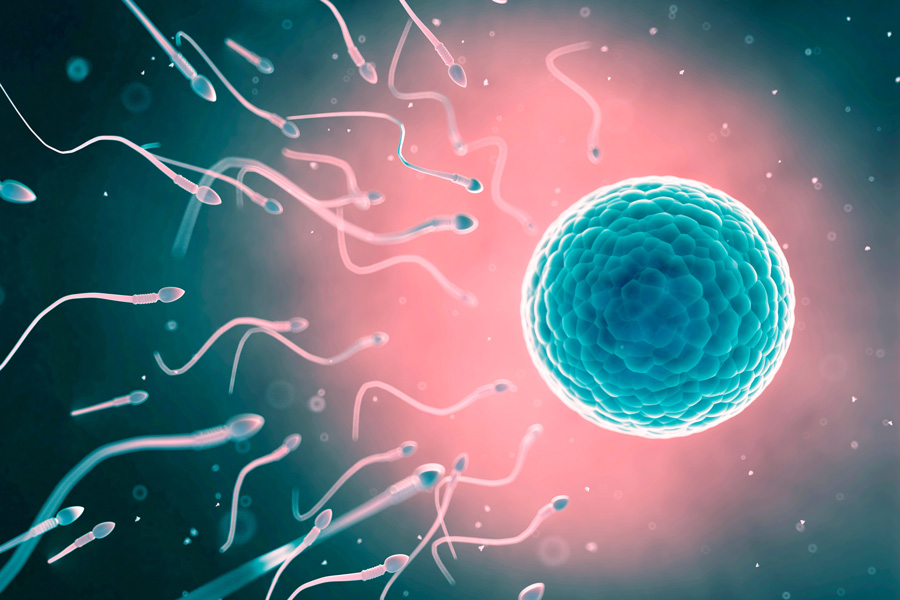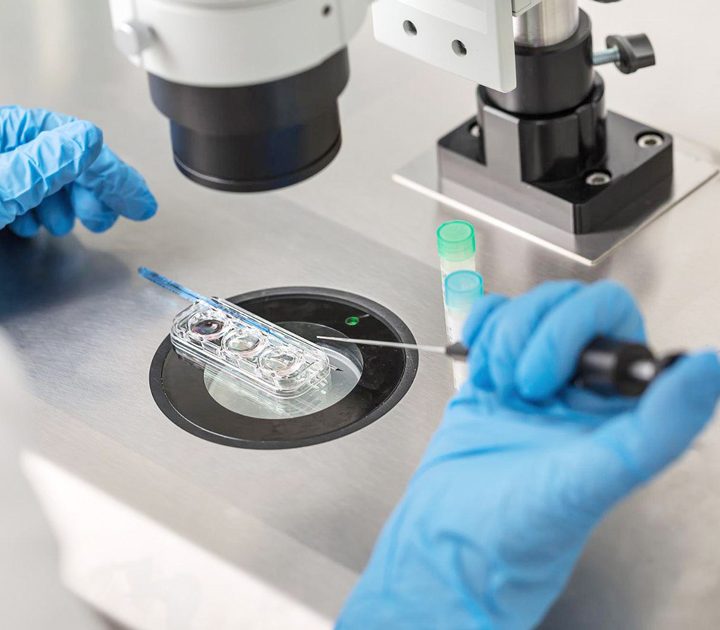
The goal of our project is to restore or preserve fertility in young women at risk of CTRI or POF. We intend to use an innovative procedure consisting in obtaining normal eggs from ovarian tissue stem cells (oogonial stem cells, OSC).
Owing to this groundbreaking method, we can not only give patients in whom traditional treatment methods failed a chance to become parents, but we can also solve three main problems associated with conventional IVF techniques:
The OSC technology was recently developed by an Italian group of clinical researchers who managed to isolate and purify oogonial stem cells, then expand them in vitro and achieve their differentiation into oocytes that can be used for IVF. Their data provide preliminary evidence that it is possible to obtain mature eggs from OSCs harvested from the ovarian cortex. This finding is a milestone compared to previous studies by other authors reporting OSC-derived neo-oogenesis in experimental models in sterilised animals, with the final outcomes being healthy pregnancies.
Our team of scientists obtained approval from the Bioethics Committee to conduct research in this area.
Badanie zakłada uzyskanie prawidłowych komórek jajowych u pacjentek z przedwczesnym wygasaniem czynności jajników lub u pacjentek przed leczeniu przeciwnowotworowym, u których w wyniku leczenia może nastąpić uszkodzenie jajników. W obydwóch przypadkach pacjentki nie są zdolne do wytworzenia własnych komórek jajowych za pomocą standardowych procedur indukcji hiperowulacji, stosowanych przy procedurze zapłodnienia pozaustrojowego. Z tego względu jedyną obecnie dostępną metodą leczenia tej grupy pacjentek jest wykorzystanie komórek rozrodczych pochodzących z dawstwa komórek jajowych od innych kobiet. Naszym celem jest uzyskanie u uczestniczek badania autologicznych komórek jajowych, tak aby niepartnerskie dawstwo nie było konieczne. Chcielibyśmy aby wynikiem prac B+R było uzyskanie u pacjentek zdrowej ciąży.

Obtaining oocytes from OSCs is the critical stage for the success of research. For this purpose, a small section (about 2-5 mm) of the ovarian cortex is collected using endoscopy (laparoscopy). The tissue obtained will be used to isolate ovarian stem cells, from which eggs will then be differentiated in vitro. The individual activities at this stage include OSC processing/isolation under laboratory conditions. Stem cells isolated from the ovarian cortical tissue will be subject to sorting and selection to obtain only the DDX4+ cell population, followed by purification. The selected OSC population will be cultured in vitro for expansion and differentiation into oocytes. Cell maturity will be checked by analysing the expression of maturation genes (GDF9, SYCP3, NOBOX, ZP1-3, POU5F1). After obtaining mature oocytes, genetic tests similar to those performed during standard pre-implantation diagnosis (PGT) will be performed.
These tests are run to detect aneuploidy, single-gene defects and structural rearrangements of chromosomes. The tests will be performed using modern NGS technology and standard PCR. They will be performed by qualified personnel supervised by our scientific consultant – Dr. S. Palini from an Italian team of researches. Detection of the expression of other genes responsible for oocyte maturation, which may facilitate obtaining autologous oocytes in a group of patients with ovarian failure in the future, will be an additional, very important outcome of the conducted research.
Further procedures will involve performing IVF using the ICSI method (intracytoplasmic sperm injection). Only healthy eggs obtained from stem cells will be used for the IVF procedure. After fertilization, the cells will be placed in special incubators to ensure optimal conditions for the development of the embryo. Normally developing embryos will be transferred to the patient’s uterus.
Obtaining a healthy pregnancy is the primary goal of the research.
The efficacy of the method will be assessed at the end of the study to confirm the design assumptions. The research will be concluded with a recommendation to use this infertility treatment method on a wider scale rather than only as part of R&D projects.

The Silesian Centre of Entrepreneurship in Chorzów gave a positive opinion on the application of Oncouniverse Sp z o.o. for co-financing (PLN 2,662,180) the project, which is worth PLN 3,633,300, on screening and validation of the liquid biopsy method in the Silesian population for restoring fertility in women with POF or CTRI.
FERTILITY PROJECT
TITLE:
Restoring female fertility with ovarian stem cells (OSC): development of integrative programmes to regenerate germ cell-depleted ovaries in women after cancer treatment and women with premature ovarian failure (POF).
PROJECT IMPLEMENTATION:
January 1st, 2022 – June 30th, 2023
Team:
prof. Simone Palini
prof. Anita Olejek
Jacek Magnucki, MD, PhD
Krzysztof Grettka, MD, PhD
leave your email or phone number we will call you back
Fertilita © 2022. Wszelkie prawa zastrzeżone.
Projekt: kreatywnepiksele.pl